5+ SAMPLE Event Management Development Plan
-
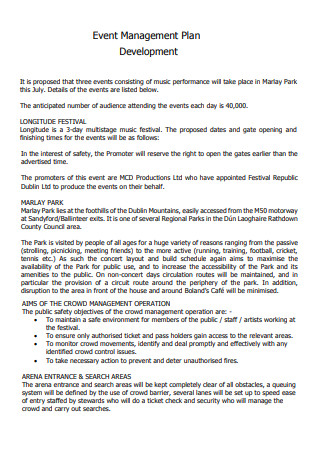
Festival Event Management Development Plan
download now -
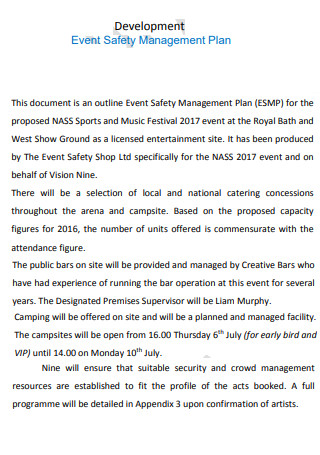
Event Safety Management Development Plan
download now -
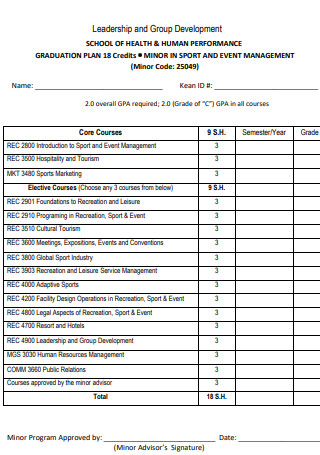
Event Management Development Graduation Plan
download now -
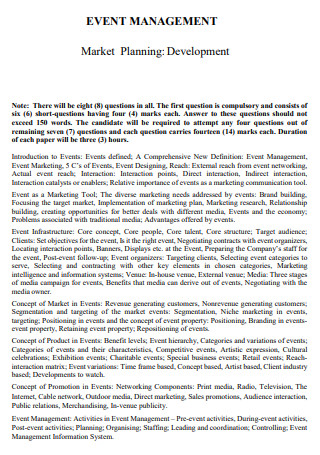
Event Management Marketing Development Plan
download now -
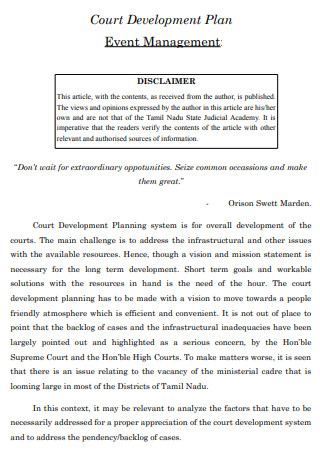
Event Management Court Development Plan
download now -
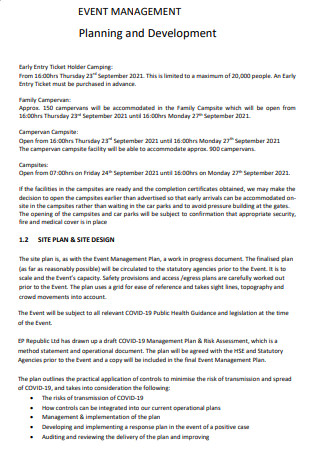
Event Management Development Summary Plan
download now
FREE Event Management Development Plan s to Download
5+ SAMPLE Event Management Development Plan
What is an Event Management Development Plan?
Different Types of Event Management Development Plans
Basic Elements of an Event Management Development Plan
How to Write an Event Management Development Plan
FAQs
What are some examples of event management development plans?
What are the major phases of event management?
What are the key elements that should be included in an event management development plan?
What are the duties and responsibilities of an event planner?
What is an Event Management Development Plan?
An event management development plan is a comprehensible and well-coordinated roadmap composed of clear event goals, objectives, budget, as well as detailed information about the event management team, event venue, event concept and branding, outline of program development, names of confirmed sponsors, exhibitors and/or speakers, and other points related to the event project management. This document acts as a blueprint so that both the event manager, the event planning team and the prospective client have adequate information and insight concerning the overall management and development process of the events such as festivals, corporate events, business conferences, art trade expos, training and seminars, gala events, job fairs, VIP events, wedding events, graduation events, annual high school alumni reunion, etc.
Due to the widespread effect of COVID-19 pandemic, event managers and event organizers are using strong event management strategies as they are now holding virtual events. Several statistical reports show that more than 80% of event organizers have reached a broader audience with virtual events and 93% of event marketers plan to invest in virtual events in the coming future. Thus, all kinds of event organizers, wedding event planners, corporate event managers, special event planners, and other key individuals in event management development planning firms should effectively create a well-integrated event management development plan.
Different Types of Event Management Development Plans
Events are times and opportunities on how different kinds of people gather together for enjoyment, celebration and/or education. There are personal events, annual events and special events. Event project planners are hired for managing and structuring the flow of an event. Bonita M. Kolb wrote in the book Event Management for the Tourism and Hospitality Industries that event management applies management concepts to the planning and running of all types of events. Hospitality managers, tourism organizations and event planners are usually involved in developing new events that will bring visitors and revenue to the community. Professional event planners need to organize various fundamental components including foods, lodging, and transportation while turning each event personalized and sophisticated. Here we will explain to you about the different types of event management development plans below:
1. Festival Event Management Development Plan
Cannes Film Festival in France, Sky Lantern Festival in Taiwan, Sundance Film Festival in USA, Wakakusa Yamayaki in Japan, and Harbin International Ice and Snow Festival in China are some examples of famous festivals around the world. Cannes Film Festival exists as one of the leading film festivals worldwide, being one of the most prestigious events in the film and movie industry as it features high quality films and glamorous and fashionable movie actors and actresses gracing the red carpet. Originating in the Xing Dynasty, the Sky Lantern Festival is one of the best cultural festivals in the world as it highlights the display of scribbled messages of the people’s hopes and dreams through the flying lanterns. Wakakusa Yamayaki, a Japanese festival which means ‘The Mountain Roast’ , happens on the 4th Saturday in January annually. The Harbin International Ice and Snow Festival is an international ice festival and competition event that takes place every year in Harbin, China as it showcases enormous snow and ice sculptures from different countries competing in the competition. If you are considering managing and developing a specific festival event in your local area, you need to write a cohesive festival event management development plan so that you and your event planning team can be successful.
2. Corporate Event Management Marketing Development Plan
Conference events are generally organized by corporate groups and business firms to provide valuable information concerning the upcoming business plans throughout the year or coming years. Prior to the pandemic, these corporate events were held in locations like small conference rooms or large convention halls. But nowadays, corporate events are held virtually and broadcasted online. For example, SM Entertainment, one of the leading music and entertainment labels in South Korea, held SM Congress 2021 and shared their upcoming artist comebacks and business expansions. CEO Lee Sooman informed the audience about the company’s future as he pointed out these highlights: SM Culture Universe (SMCU), remastering previously released music video projects, aespa and NCT comeback projects, SM Classics, SM Originals, and many others. Releasing the business conference video to the public is an effective method to increase their sales and marketing performance. So, preparing a corporate event management marketing development plan is a useful tool to outline a company’s upcoming goals and vision, and showcase them to their loyal customers.
3. Art Exhibition, Trade Shows and Expos Event Management Development Plan
A report states that 88% of business firms and organizations mainly participate in a trade show to raise awareness of their brand. Another report revealed that 83% of companies say their top reason for attending a trade show is to increase their sales performance. Art exhibitions, trade shows and expos provide several benefits for businesses such as meeting and connecting with potential clients, increasing brand awareness, gaining more knowledge of the industry, cost-effective marketing, closing deals, searching valuable brand partners, and launching a new product. As many events moved to virtual settings, there are convention centers that install broadcasting centers for remote attendees to experience art exhibits virtually. In South Korea, there is a contemporary art exhibition titled “Art in Metaverse”, located at Under Stand Avenue, a cultural complex in Seoul Forest, Seongdong District. It is an exhibition hosted by Artscloud as it is being held offline and also available online via the Vertical Metaverse Platform. It showcases digital artworks, and video artworks which can be seen through virtual reality (VR) and augmented reality (AR). Thus, writing a compelling event management development plan for art exhibitions, trade shows and expos are important to develop these events fully well.
4. Global Music Concert Event Management Development Plan
Soompi reported that SMTOWN Live 2022 online concert became a record-breaking online concert event, having 51 million streams from 161 different regions around the world, surpassing their record of 35.83 million streams from their 2021 live online concert. It was streamed for free and featured various live performances and collaborations by their artists such as SHINee’s Onew, Key and Minho, Girls Generation’s Taeyeon and Hyoyeon, aespa, H.O.T.’s Kangta, BoA, TVXQ, Super Junior, EXO’s Kai, Red Velvet, NCT U, NCT 127, NCT Dream and WayV’s Kun and Xiaojun. Creating a well-designed global music concert event management development plan is crucial for the success of every global music concert.
Basic Elements of an Event Management Development Plan
In this section, you will learn how to construct an exceptionally-written and comprehensive event management development plan. However, an event management development plan has different elements. Include the following elements for you to create a profound piece of writing:
How to Write an Event Management Development Plan
While creating a clear and structured event management development plan, event managers and organizers should consider conceptualizing the event, developing a theme, budgeting, setting timelines, selecting and reserving event venues, planning the food, selecting speakers, arranging for equipment and facilities, coordinating transportation, contingency planning, controlling proper measures, managing event team, coordinating supplier/vendor, frontline management, backend management and communication. Below are some easy-to-follow tips that indicate how to write a clear and systematic event management development plan:
Step 1: Identify the Goals and Objectives, and Scope of the Planned Event
The first step in writing an event management development plan is identifying the goals and objectives of the planned event. Are you planning to drive new sales? Do you want to further increase your brand awareness? Think carefully on what you really want to achieve and how planning this event will help you in accomplishing your goals. Then, determine a specific set of objectives which will support your primary goal. Create a scope of the event which contains the major details of your event project.
Step 2: Set the Budget, and Arrange the Key Details of the Event
Establishing a realistic budget is a helpful way to prevent you from having issues and concerns when the event takes place. Map out your overall budget in advance while updating your variables and staying close to the event development process. Break down your budget into marketing and promotion (43%), speakers and talent (32%), printed materials (29%) and venues (18%) as told by Eventbrite. Then, build your event management team and designate the crucial roles of each member like the project manager, venue manager, scheduling manager, creative designers, marketing and communications manager, and others early on to ensure accountability. After that, choose the venue and date of the event.
Step 3: Develop the Event Concept and Branding
When it comes to conceptualizing and branding an event, you need to make sure in determining the why, who, when, where, and what of the event. Is your event important to inform or educate the people in your community? Who are the attendees, guest speakers, and/or stakeholders of the event? The event concept and branding needs to be suitable to the needs, wants, desires and expectations of the audience. So, brainstorm the event name, theme, logo, colors, typography, on-site decor, email, signage and more.
Step 4: Plan the Event Program
Set your event agenda ahead of time. Consider the speakers, sponsors, workshops, tasks, and other activities that will be done in the event. Make some updates or adjustments in your event program if necessary. Use several apps and websites for event management to guide you in your scheduling process. Do your best to structure the basic framework of the program effectively. Confirm your sponsors, exhibitors, and speakers as you call for session submissions, and manage them well.
Step 5: Review and Execute the Plan
Carefully review your entire event management and development plan for the given project and make sure that you fully include all the vital elements in your scope of work. If you notice that you overlook some sections that need additional points, we suggest that you edit and revise the document. After the proofreading and revision phase, you can now finally execute the event management development plan.
FAQs
What are some examples of event management development plans?
Some examples of event management development plans are festival event management development plan, event safety management development plan, event management development graduation plan, corporate event management marketing development plan, art exhibition, trade shows and expos event management development plan, global music concert event management development plan, fundraising event management development plan, VIP event management development plan, team building event management development plan, job fair / recruiting event management development plan, product launch event management development plan, thought leadership event management development plan, and more.
What are the major phases of event management?
The major phases of event management are event concept, event coordination, event control, event culmination, and even closeout. Event concept is matching the needs, preferences and expectations of the audience while integrating the who, why, when and where of the event. Event coordination is the development of the event theme, budgeting, program timelines, selection of event venues, food preparation, selection of speakers, arrangement of equipment and others. Event control is facilitating control on certain measures. Event culmination is the results of all the previous planning stages. Event closeout is the conclusion of the event.
What are the key elements that should be included in an event management development plan?
The key elements that should be included in an event management development plan are event management planning overview, event objectives, intended deliverables, significant milestones, reports, and end products.
What are the duties and responsibilities of an event planner?
An event planner is a professional planner who manages specific timelines and programs for the smooth execution of a planned event. He or she designs the overall event experience: from the initial event concept through event design development and production considerations.
Jung Lee, celebrity event planner/producer, said: “Just because you have planned something doesn’t mean it is going to happen.” Many professional event planners also experience some unexpected situations while organizing several events. Despite the mishaps, careful event planning especially in emergency situations or developing an event emergency action plan is very important when you create your event management development plan. So, creating a simple and well-structured event management development plan is worthwhile in the execution of a strategic event management plan, allowing event success. We have included several event management development plan samples that you can download in this article like event planner templates, business event planning templates, event organizational chart and development plan templates, event project timeline development plan templates, etc.
